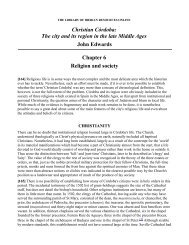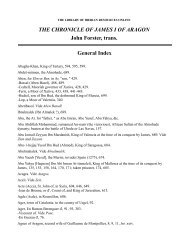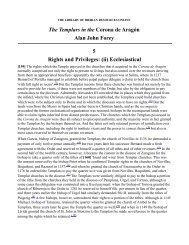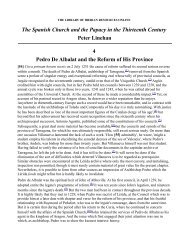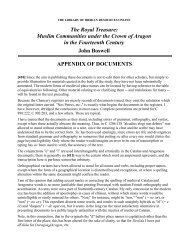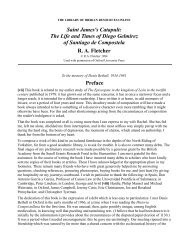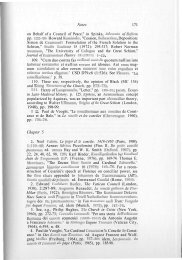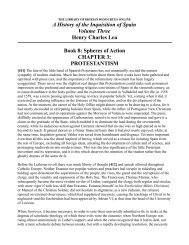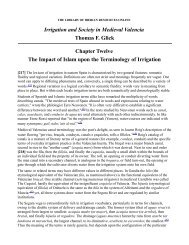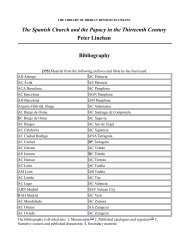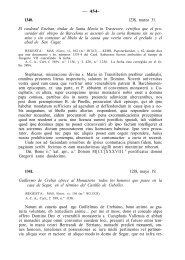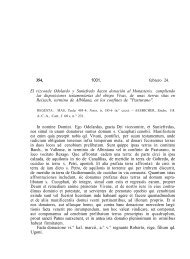Chapter 11 - The Library of Iberian Resources Online
Chapter 11 - The Library of Iberian Resources Online
Chapter 11 - The Library of Iberian Resources Online
Create successful ePaper yourself
Turn your PDF publications into a flip-book with our unique Google optimized e-Paper software.
Rosa de beldad'<br />
e de parecer<br />
e Fror d'alegria<br />
e de prazer,<br />
Dona en mui pia-<br />
dosa seer,<br />
Sennor en toller<br />
coitas e doores<br />
b 10(5+5)<br />
b 10(6+4<br />
b 10(6+4)<br />
a 10(5+5)<br />
C<br />
B'<br />
C<br />
B'<br />
E<br />
F<br />
B<br />
A x+y<br />
<strong>The</strong> only melodic discrepancy that exists between "Rosa das rosas" <strong>of</strong> the Toledo (To) and Escorial (B.<br />
I. 2. ) codices can be found in the initial melody phrase, above the syllable " ro " (see Example <strong>11</strong>-4). In<br />
the former codex, the two-note ligature above that syllable is podatus (b-flat-c; or f-g, transposed down<br />
a perfect 4th), whereas in the latter, it is a three-note ligature, scandius (e-f-g). It is possible, as Josué T.<br />
Wilkes suggested, that this was the cause <strong>of</strong> scribal error, "by mere recollection, not totally exact" (por<br />
simple recordación, no por curto exacta ) , even though two distinct notational systems were employed,<br />
the earlier <strong>of</strong> which the scribe may not have taken care to verify. [42]<br />
To Collet and Villalba's statement that the melodic incipit <strong>of</strong> "Rosa das rosas" is a general formula <strong>of</strong><br />
plain chant in the Dorian mode (" est une formule genérale de plain-chant ( I er mode 'gravis' [the<br />
Dorian mode])"), Wilkes responded:<br />
Rather than a general formula that usually comprises but three or four principal tones<br />
within the ecclesiastical modality, the tune <strong>of</strong> the cantiga would have suggested to the<br />
composer any one <strong>of</strong> the melodies from the Christian liturgy. [43]<br />
[181] Yet the most crucial element distinguishing Schindler's example and Ribera's<br />
transcription from the others is modality. We have speculated earlier that Schindler's<br />
informant may have been acquainted with Ribera's transcription, thus explaining their<br />
common modality (D minor, with a raised 7th), which would seem to be more than<br />
coincidental. Be that as it may, Ribera's transcriptions <strong>of</strong> the Toledo codex have<br />
continued to provoke criticism, and Wilkes has devoted a major part <strong>of</strong> his article to<br />
condemning Ribera's views on modality. 44<br />
Of all the literary and scientific works produced under the sponsorship <strong>of</strong> Alfonso X the Wise, the<br />
Cantigas de Santa Maria remained his most cherished. <strong>The</strong> performances <strong>of</strong> songs from this unique<br />
collection, which was compiled, ordered, and lavishly illustrated under his supervision, continue to<br />
delight audiences throughout the world. Schindler himself was responsible for such performances; all<br />
the same, he was truly excited when he confronted the tune in what he believed to be "oral tradition. "<br />
Nonetheless, one can only hope that this and other tunes from the collection are still lurking<br />
somewhere on the <strong>Iberian</strong> peninsula.<br />
Notes for <strong>Chapter</strong> Eleven<br />
[1] . Alfonso's text reads: "Otros í mandamos, que todos los libros de los Cantares de loor de Santa<br />
Maria sean todos en aquella iglesia de nuestro cuerpo se enterrare, e que los fagan cantar las fiestas de<br />
Sancta Maria. E si aquel que lo nuestro heredare con derecho e por nos, quisiere haber estos libros de<br />
los Cantares de Sancta Maria, mandamos que faga por ende bien et algo a la iglesia onde los tomare<br />
porque los haya con merced e sin pecado." See Alfonso X, Antología ( ed . A. G. Solalinde , Madrid:



